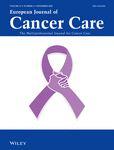Extrinsic emotional regulation experienced by lung cancer patients and their family caregivers during progression-free survival
Funding information: Minzu University of China, Grant/Award Number: 2022QNPY02
Abstract
Introduction
Existing research has found that both lung cancer patients and their informal caregivers reported higher level of emotional distress and psychological maladjustment. However, limited attention has been afforded to collective emotional experiences in patient-caregiver dyad, especially during progression-free survival.
Objective
This study attempted to explore extrinsic emotional regulation experienced by lung cancer patients and familial caregivers in China.
Methods
By adopting a qualitative descriptive approach, data were collected using face-to-face, in-depth semi-structured interviews from July to August 2021. Using purposively sampling, this study interviewed 13 patients and 7 caregivers through conjoint and individual interviews.
Results
Based on data analysis, findings demonstrated emotional congruence, implicit emotional disclosure and emotional contagion within families as indicators of mutual responsiveness to cancer in patient–caregiver dyads. Furthermore, caregivers tended to adopt relationship engagement to facilitate patients to maintain mental wellness during PFS. Oncology care should promote the implement of patient- and family-centred care, especially enhancing dyadic coping in emotional regulation.
Conclusion
Patients and caregivers experienced mutual responsiveness to cancer-induced emotions. Additionally, caregivers adopted relationship-based care ethics to facilitate patients to maintain mental wellness.
CONFLICT OF INTEREST
The authors have no funding or conflict of interest to disclose.
Open Research
DATA AVAILABILITY STATEMENT
The dataset was available if required.




